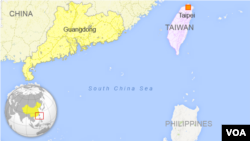Taiwan and China have wrapped up the first round of trade talks aimed at cutting import tariffs on a wide range of goods. Despite political worries in Taiwan about the risks of strengthening ties with Beijing, many say the country’s businesses could lose out if the talks drag on, and China strikes a trade liberalization deal with South Korea in the meantime.
Trade representatives from China and Taiwan met for three days last week near Taipei to start talks on an agreement that would cut tariffs on Taiwanese products such as flat panel screens, machine tools and petrochemical goods.
China and Taiwan have already signed a service trade pact in June 2013, but Taiwan’s lawmakers still have not ratified it. Their reluctance is partly a response to the outpouring of opposition earlier this year by protesters who say the service trade pact will hurt the island’s economy and make it more vulnerable to pressure from Beijing.
Now, as the two sides embark on a similar pact for products, negotiators worry that South Korea may wrap up a similar deal first and get more from China’s massive economy.
The situation poses a tricky political test as Taiwanese leaders hope to balance public unease over increasing ties with China, against the needs of the country’s economy, which could get a boost from increasing trade with Beijing.
China also wants to show Taiwan goodwill ahead of tense local elections in November, when the Beijing-friendly ruling party runs to expand its mandate. Liu Yi-jiun, a public affairs professor at Fo Guang University, explains.
“Right now Taiwan is kind of deeply worried. The kind of competition between South Korea and Taiwan is rather intense. As long as South Korea is getting ahead, that really worries the leaders here. Mainland China just wants show more friendly gestures and try to have more influence on the election,” Liu Yi-jiun stated.
Taiwan and China have been separately ruled since the Chinese civil war of the 1940s, but China claims sovereignty over the island. In 2008, Taiwan President Ma Ying-jeou laid aside political differences to ease tensions with Beijing through trade and investment agreements.
Deals reached since then brought two-way trade to $124 billion last year, making China Taiwan’s top trading partner. But officials in Taipei now fear losing out to fellow export-led economies such as South Korea and the Association of Southeast Asian Nations as they tap China for more market access. Analysts in Taipei say China hopes trade deals with Taiwan can win points toward its goal of political unification of the two sides.
Taiwan has tested China’s patience when parliament shelved the service trade pact indefinitely, stalling liberalization in 144 sectors such banking and tourism. Taiwanese lawmakers shied away from ratifying the pact after hundreds of university students occupied the legislative chambers in March and thousands more massed in the streets to argue that Taiwan and its long-time Communist rival were growing too close.
Now Taiwan’s political parties are focused on year-end local elections, likely delaying ratification of the service trade deal until the first half of 2015. Taiwanese officials expect at least two more working-level meetings on the trade-in-goods agreement with ratification possible by the end of next year.




